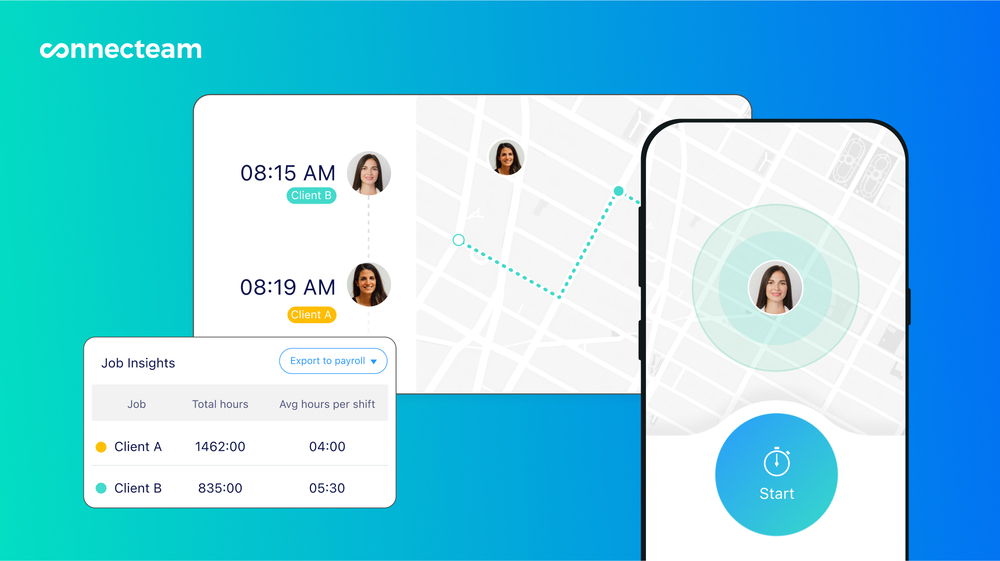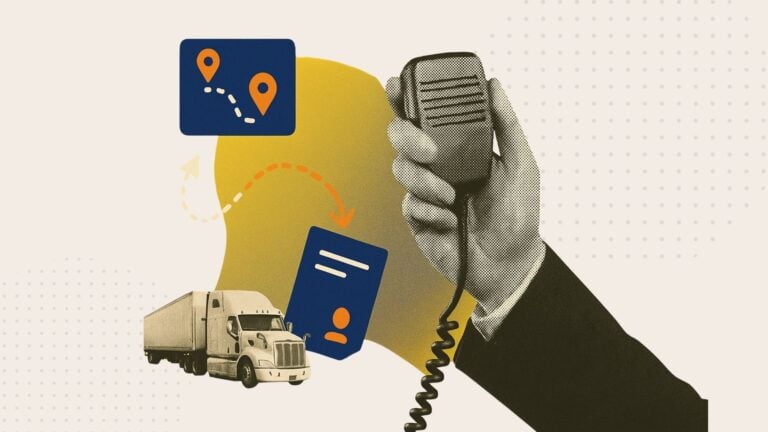Want to become a truck dispatcher but not sure where to start? This guide breaks down every step so you can land your first dispatcher job.
If you’re looking for a fast-paced, in-demand career with a surprisingly easy entry point, truck dispatching might be for you.
In this guide, we cover what dispatches do, how to become one, and what kind of training can help you.
Keep reading to learn more.
Key Takeaways
- Truck dispatchers coordinate drivers, freight, and routes to ensure timely deliveries. They manage schedules, track shipments, and communicate with both drivers and customers.
- The average salary for U.S. truck dispatches is around $45,000 per year, not including independent or self-employed dispatchers.
- Truck dispatching jobs are a good fit for people who are organized, detail-oriented, and interested in logistics.
- Training is an important part of becoming a truck dispatcher. Courses can help you build the skills and knowledge you need to succeed in the role.
What Does a Truck Dispatcher Do?
Truck dispatchers coordinate drivers, trucks, and freight (commercial goods transported by land) to ensure shipments arrive to their destinations on time and efficiently. Dispatchers are the communication hub between shippers, carriers, and receivers.
Dispatchers usually work for motor carriers (companies that own and operate trucks), which can range from nationwide fleets to individual owner-operators. Some dispatchers work independently, contracting out their services to multiple carriers.
Here are some of the things truck dispatchers handle:
- Assigning loads and routes to drivers
- Communicating with drivers, carriers, and clients
- Optimizing delivery routes
- Tracking shipments from pickup to delivery
- Negotiating rates and resolving billing issues
- Keeping records of deliveries and freight orders
Most of this work is done using truck dispatch software. One standard tool is the load board, which is a platform for shippers to post loads and carriers list available trucks. Dispatchers use it to find jobs, make connections, and match loads with drivers. They also use tools for GPS tracking, communication, and workforce management.
Since most of the job is done by phone and computer, many dispatchers work remotely. You can join a carrier’s internal team, work as an independent contractor, or even launch your own dispatching business.
Did You Know?
Connecteam is an all-in-one dispatch software solution with built-in scheduling, GPS location tracking, secure chat, and real-time job updates. It helps dispatchers stay on top of every delivery, from one vehicle to an entire fleet.
Get started with Connecteam for free today!

How Much Does a Truck Dispatcher Make?
In 2025, the average annual salary for a truck dispatcher in the U.S. is $45,823, according to ZipRecruiter. The salary range for truck dispatchers is $30,000 to $75,000, depending on factors like experience, location, and employer size.
This estimate doesn’t include independent dispatchers or those who run their own dispatching businesses, whose earnings can differ based on workload, clients, and rates.
Why Should I Become a Truck Dispatcher?
Everyone has a different path that led them to dispatching. Some dispatchers knew they wanted to work in logistics at a young age, while others decided to switch careers later in life. Regardless of your background, dispatching can be fulfilling work.
Here are some common reasons people become dispatchers:
-
It’s challenging and rewarding work
-
It offers more flexibility
-
It’s essential work across industries
-
It can lead to bigger opportunities
-
The industry is growing
Truck dispatching requires you to manage routes, solve problems on the fly, juggle schedules, and keep freight moving. If you love tackling logistics, communications, and multitasking, this dynamic job will keep you engaged and satisfied.
Many dispatchers work remotely and set flexible schedules with the help of dispatch software. That means a healthy work-life balance, and more freedom to plan your professional day around your personal priorities.
Dispatchers play a key role in the supply chain for industries like transportation, logistics, and retail. They make sure freight arrives safely and on time, directly affecting businesses and the economy. Knowing the impact of your work can give you a strong sense of purpose, leading to greater job satisfaction and engagement.
Dispatching is a good starting point for a long-time career in logistics. You can develop the skills you need for roles like transportation manager or operations supervisor. This experience can also help you to open your own dispatching business down the line.
According to the Bureau of Labor Statistics, employment in the industry is expected to grow 9% from 2023 to 2033. As the demand for delivery services increases with the continued growth of e-commerce, so does the need for truck drivers. With more truck drivers on the road, there will be a need for skilled dispatchers as the field expands.
How To Become a Truck Dispatcher: Step by Step
Getting into dispatching is easier than you may think. Here are a few steps to take to become a truck dispatcher and land your first job:
Step 1: Complete relevant education (if necessary)
Most dispatching roles only require a high school diploma or a GED. If you already have one, you’re set. If not, you can sign up online for the GED test, study with free or paid practice materials, and take the four subject exams.
You can even take the tests individually and complete them online. To earn your GED, you’ll need to score at least 145 out of 200 on each exam.
Once you’re ready to take the test, find a test center near you. There’s also an option to take it online. You’ll need to score at least 145 out of 200 on all 4 subject exams to receive your GED credential.
Each exam costs $36 on average, or $144 for all four exams. Some states, including Connecticut, New York, and West Virginia offer the exams for free, while states like South Dakota charge as much $50 per exam.
Step 2: Build industry knowledge and soft skills
Truck dispatching requires excellent communication, time management, and multitasking. Strengthen these skills by practicing decision-making under pressure, using time blocking tools like the Pomodoro technique, or signing up for training workshops.
Research the trucking industry, learn key terminology, and stay up to date with publications or LinkedIn. Get a sense of dispatching software by signing up for free trials, watching tutorials, and testing out the software to build up your confidence and familiarity for your new role.
Did You Know?
Microlearning, or short, focused lessons, can boost knowledge retention and reduce burnout.
Step 3: Take a truck dispatching training course
The best way to gain hands-on experience and learn displaying fast is to take a focused course. These courses are sometimes called “freight dispatcher training” and usually take just a few days or weeks to complete. Many are available online and vary in price.
Check out our top course recommendations below to start your journey today.
Step 4: Network with dispatching professionals
Start connecting with dispatchers and logistics professionals through LinkedIn or industry events. You can reach out to existing contacts or send personalized messages to speak with people in the field. Ask for their advice, insights, or even mentorship.
You can also engage in online conversations, respond to posts, and share what you’re learning to grow your network. Networking may seem nerve-wracking, but it can open doors to job leads and provide insider advice that sets you apart.
Step 5: Update your resume and apply
Update your resume to reflect your dispatching training, certifications, and skills. Use the top section of your resume to highlight relevant soft skills and technical knowledge.
It might also be a good idea to update your previous experience to focus on communication, coordination, and problem solving. Use job-specific keywords to grab the attention of hiring managers and increase your chances of standing out.
Start looking for jobs with titles like “truck dispatcher,” “freight coordinator,” or “logistics assistant” on job boards or directly on carrier websites. Many companies offer on-the-job training for entry-level roles, which is a great opportunity to jumpstart your career.
Pro Tip
Tailor your resume to each position you apply for, and highlight your skills and experience from past roles that could be valuable for dispatching roles.
3 Best Truck Dispatching Training Courses
If you’re not sure which course to take to begin your dispatching career? Here are three of the top training programs we recommend to help you get job-ready, fast:
-
The NDFCA Dispatcher Course
-
Truck Dispatcher Training Course – Core and Extended Versions
-
Truck Dispatcher Training
Course provider: The National Dispatch and Freight Certification Association (NDFCA)
Length: Self-paced (usually completed within a several days)
Cost: $449
Great for learning the basics
The NDFCA Dispatcher Course is designed for anyone entering the logistics industry, including truckers. It covers essential terminology, common equipment, and industry technology, and important regulations like Department of Transportation (DOT) requirements.
It’s fully online and self-paced, with multiple modules and short quizzes (you’ll need to score at least 70% to pass each quiz). There’s no final exam, but you’ll earn a printable Certificate of Completion. You can also take the NDFCA National Freight Dispatcher Certification exam separately, after you’ve completed the course.
This course is a good foundation and is a prerequisite for other NDFCA programs, making it a smart choice if you plan on growing in the field.
Course provider: Learn Dispatch
Length: Self-paced (usually completed in about a week)
Cost: $360 for the Core Version; $600 for the Extended Version
Great for launching an independent truck dispatching business
Learn Dispatch offers two online courses designed for people who want to start their own dispatching business. Both are self-paced and you can pay in monthly installments.
The Core Version includes 120 interactive lessons covering industry terms, real-world scenarios, and business startup basics. It also reviews client acquisition, marketing strategies, and provides regular quizzes to test your knowledge and track your progress. You even receive templates like carrier profiles and client contracts to help set up your business.
The Extended Version expands on the Core curriculum, with an additional 55 lessons. It does deeper into trucking fundamentals, freight booking, and business marketing. There are also more real-life examples and the chance to connect directly with an instructor for support.
Both courses include a certificate of completion and 1-month subscription to the DAT Load Board.
Course provider: Truck Dispatcher Training
Length: Up to 3 weeks
Cost: $775
Great for learning in-house dispatching and becoming an independent dispatcher
This course includes 75 lessons, video classes, weekly live sessions, and guest speakers from the field. The course covers every aspect of the dispatching job, from route planning and compliance to driver drug testing.
After finishing the course, you’ll take a 100-question exam (about 30 minutes) and earn a digital certificate. In addition, you’ll complete a hands-on dispatch task live on Zoom with a professional dispatcher.
Beyond training, the course also offers career support. You’ll get one month of live mentor access (with the option to extend), help building your resume, and guidance on getting started as an independent dispatcher.
Did You Know?
Connecteam lets you and upload training courses. Or, use the AI Agent to generate dispatcher training content in minutes. Add PDFs, images, videos, quizzes, and track your team’s progress in real time.
The Bottom Line
If you’re organized, think quick, and great with people, truck dispatching could be a great career move for you. With flexibility and the chance to run your own business, dispatching offers many opportunities to fulfill both personal and professional growth.
Training courses are a good way to get started in the industry and help you build a strong foundation. Choose a course that fits your goals and gets you closer to where you want to be. Remember: every veteran dispatcher had to start somewhere.
FAQs
Yes. Truck dispatchers on average earn approximately $45,000/year. Earnings vary based on experience, clients, and workload.
Start by learning industry basics, building soft skills, and taking a dispatch training course. Then, apply for jobs or begin working independently using dispatch software.
It can be challenging, especially when managing multiple drivers and tight schedules. But with strong organization, clear communication, and the right tools, it’s very manageable and rewarding.
Take an online dispatch training course and learn how the industry works. Entry-level jobs often offer on-the-job training to help you grow into the role.
Truck dispatchers typically work full-time, with different shifts that could include early mornings, evenings, or weekends. Many operations are 24/7, so schedules can vary by company size and freight volume.
The Women in Trucking Foundation awards scholarships to women who are attending training to advance their careers within the trucking industry.




